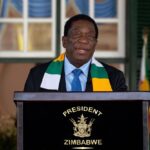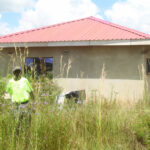Windhoek – Namibia’s fiercely contested presidential and legislative elections have ended in a storm of controversy, with the main opposition leader, Panduleni Itula of the Independent Patriots for Change (IPC), categorically rejecting the results.
Itula’s declaration, made just before polling stations closed on the extended voting period, throws the legitimacy of the election into serious question. The IPC’s refusal to accept the outcome is fuelled by widespread allegations of electoral malpractice and, significantly, accusations that Zimbabwe’s ruling Zanu-PF party actively interfered in the Namibian electoral process.
The election, originally scheduled for Wednesday, was extended after widespread logistical and technical failures caused hours-long queues at polling stations across the country. This led to numerous voters abandoning their attempts to cast their ballots, sparking outrage amongst opposition parties who alleged deliberate voter suppression.
A report by an organisation of southern African human rights lawyers, acting as election monitors, corroborated these claims, stating: “There were deliberate delays of voting processes in more than 63% of the total polling stations across the country.”
Partial results, with only a fraction of constituencies counted, showed SWAPO’s candidate, Vice President Netumbo Nandi-Ndaitwah, holding a significant lead. However, Itula, who secured a strong second-place finish in the 2019 election, declared that regardless of the final figures, the IPC would not recognise the outcome.
He stated unequivocally: “The rule of law has been grossly violated, and we cannot call these elections by any means or measure as free, fair and legitimate.”
Itula further announced the IPC’s intention to challenge the election results through established legal channels, urging President Nangolo Mbumba to convene a cabinet meeting to address the situation.
The chaotic voting process was highlighted by the experience of voters in Windhoek, the capital city. Even on the extended voting day, long queues persisted at the single polling station.
Sielfriedt Gowaseb, a 27-year-old voter who eventually cast his ballot, criticised the inadequate polling station arrangements: “They should have set up at least another polling station where the majority of Namibians live. We would have needed more venues, one in the suburbs. Most Namibians don’t live in the central business district.”
His comments reflect the widespread dissatisfaction with the logistical shortcomings that marred the election. Naita Hishoono, executive director of the Namibia Institute for Democracy, echoed these concerns, stating: “It would have been helpful to open more than 36 polling stations… each constituency should have at least one polling station open to accommodate everybody. Every voter should only stay half an hour to an hour in line and the whole voting process should take no more than 15 minutes.”
The allegations of Zanu-PF interference add a further layer of complexity to the already contentious election. These accusations are not isolated incidents; they are part of a broader pattern of alleged meddling by Zanu-PF in the electoral processes of several Southern African Development Community (SADC) member states.
Former Botswana President Ian Khama has been a vocal critic of this alleged interference, calling for sanctions against Zanu-PF, including potential expulsion from SADC, if proven to have manipulated elections in neighbouring countries. Khama cited several instances suggesting Zanu-PF’s influence in Botswana’s recent elections, including an “inexplicable benchmarking trip” by Botswana’s Independent Electoral Commission to the Zimbabwean Electoral Commission and the public support pledged by Zimbabwean President Emmerson Mnangagwa for Botswana’s ruling party.
These accusations extend beyond Botswana. Zanu-PF has also been implicated in alleged interference in the elections of Mozambique, Zambia, and South Africa. Shepherd Yuda, a Zimbabwean TV whistleblower and human rights activist, claimed that Zanu-PF’s actions in Mozambique led to violence and civil unrest, part of a broader strategy for regional dominance.
The South African Democratic Alliance (DA) has even called for Zanu-PF to be barred from participating in South Africa’s 2024 elections due to its alleged history of electoral manipulation. Economic Freedom Fighters (EFF) international relations commissar Godrich Gardee detailed specific methods allegedly used by Zanu-PF to rig elections, including the manipulation of result slips during the vote counting process.
The close ties between Namibia’s ruling SWAPO party and Zanu-PF have further fuelled concerns. Reports of financial transactions between individuals linked to Zanu-PF and SWAPO, including a significant donation to SWAPO from a Zimbabwean controversial businessman, have raised alarm bells. The awarding of a ballot production tender to a company connected to a businessman close to Mnangagwa also sparked controversy, prompting accusations of a coordinated effort to manipulate Namibia’s electoral process.
Several Namibian political leaders have condemned the alleged Zanu-PF interference, highlighting the gravity of the situation and the need for a thorough investigation into the allegations. While SWAPO’s youth league dismissed the allegations as “Western propaganda,” the accusations of Zanu-PF interference cast a long shadow over the Namibian election results, leaving the country’s political future uncertain.












